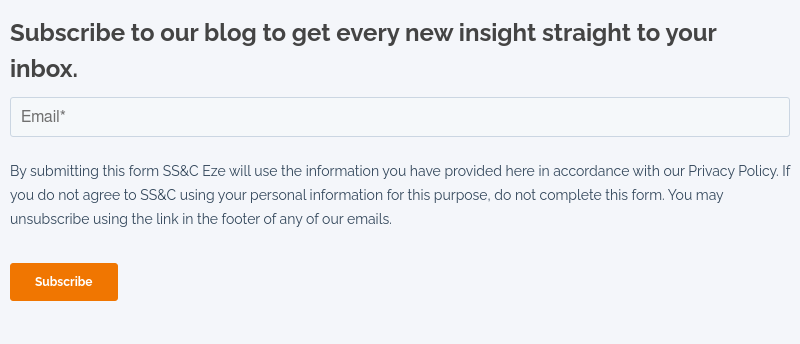Are you tracking investments in spreadsheets or limited accounting and reporting software?
In this episode of our Tech It Up podcast, Starting Up Right: Accounting Must-Haves, Aani Nerlekar, vice president of solutions management and sales engineering at SS&C, and Stephen Ruane, senior director of product management at SS&C, join hosts Jasmin Conner and Trent Berry to discuss the challenges startup and emerging funds face in building out their back-office investment operations.
With a collective 30+ years spent shaping and executing SS&C product roadmaps to meet evolving alternatives manager and market needs, Aani and Steve outline how startup and emerging firms can design a tech stack that will grow with them, share the accounting functionality firms should prioritize in building out their back-office operations, and tease some upcoming Eze Eclipse enhancements.

Why a Patchwork Back Office Doesn’t Work
Startup firms often overlook the strategic advantage to be gained by laying critical back-office groundwork from the start. They figure they can track investments in spreadsheets or limited accounting and reporting software to keep overhead down and then add solutions as they grow.
Unfortunately, this often leads to a patchwork of disparate systems that cause operational inefficiencies, data inconsistencies, and increased operating expenses as the firm attempts to scale.
Download our whitepaper, Patchwork Doesn’t Work Anymore, to learn how a single platform approach can help emerging firms gain a competitive advantage.
Building a Sustainable Startup Accounting Operation on a Budget
In the podcast episode, Aani points out, “As an emerging manager, you are working with a limited budget.” With narrow resources, how can growing funds build a cohesive system today that will serve them over the long run?
According to Aani and Steve, it requires prioritization and focused investment in the things that matter most.
Host Jasmine asks what it is firms should prioritize when it comes to back-office accounting functionality.
Steve shares that in addition to managing expenses, determining end-of-month NAVs, and ensuring your trial balance is reconciled, it is key that the back office “is providing the front office with accurate information on position inventory, P&L, returns, and ensuring, especially in the emerging hedge fund space, that you can provide an accurate shadow to your administrator.”
He also shares that because startup firms are incredibly busy and short on resources, maximizing efficiencies and automating as many of these processes as possible is essential.
What to Prioritize in an Efficient Back Office Operation
According to Aani and Steve, to efficiently and effectively support the front office and shadow your administrator, alternatives managers should be on the lookout for these accounting system “must-haves:”
- Automation: With limited resources, startups look to automate back-office processes that do not require human touch. This might include automating corporate actions processing, reconciliation with your PB or fund admin, or financing accruals, coupon payments, and unwinds.
- Flexibility: It’s crucial that a shadow accounting system offers flexible journal entries so firms can handle complex financial transactions, like processing corporate actions by location or fund, allowing different FX rates for different valuations, or matching a variety of administrators.
- Transparency: The ability to understand, track, and report on where your data is coming from is essential to the entire operation. This transparency allows the back office to dig into trial balances and journal entries and drill down into those balance details to understand an investment’s full P&L, inclusive of financing or stock loan rebate.
- Co-sourcing Solutions: As your firm scales, there are certain functions you’ll want to retain in-house and others that can be better and more efficiently completed elsewhere through a co-sourcing partnership. Ensuring your solution offers these types of partnerships from the start will save you costs and hassle down the line.
The duo closes out the episode by sharing how SS&C’s Eclipse can help firms’ back offices at the start and as they scale and tease some upcoming Eclipse functionality users won’t want to miss.
Dive deeper into these accounting “must-haves” in the episode or learn more about Eclipse’s accounting functionality.


